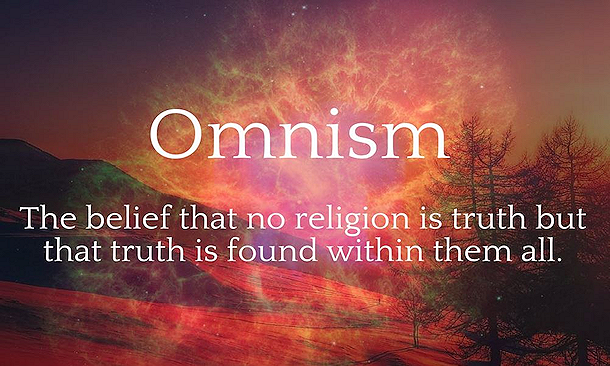An Omnist is someone who seeks and is open to spiritual truths from many religions and then comes up with their own individual form of faith or spirituality. Omnists realize that although all religions have some powerful spiritual truths and great wisdom in them which can be very inspirational and moving, they also contain a lot of human opinion, social politics, and outdated viewpoints (beliefs and rules that made sense at one point in history but don’t apply as well in today’s world). Omnists explore spirituality and religion in a modern context using reason and their intelligence as well as their intuition and insights gained from personal mystical/spiritual experiences. The key is what has meaning and relevance to each individual in their seeking. You could say that for Omnists the focus is spirituality more than religion and the general approach is exploratory and open minded rather than dogmatic and rule-based. Omnists tend to be freethinking, non-dogmatic, non-hierarchical, syncretistic and science-friendly. Omnists respect the rights of each individual to have their own spiritual/religious views as long as those views do not espouse harming or being intolerant of those who disagree with them.
Omnism differs from agnosticism in that it implies a more active personal spiritual exploration rather than a detached belief that there is probably some sort of higher power or consciousness. Also, there is no reason that Omnism needs to be an “exclusive” sort of label. Many people feel strongly about their own religion, using it as their spiritual center, and yet are open to, and actively study, the spiritual ideas and wisdom of other traditions. One could easily be a Christian Omnist, a Buddhist Omnist, a Neo-Pagan Omnist, etc.
Obviously some sort of sensible constraints or guidelines are necessary as one explores various spiritual paths. Here are some that seem to be practical and common to the many types of spiritual seekers I’ve known over the years. First of all there are the basic common moral values of not killing, not stealing and not lying (valuing life, property, truth). In addition I would add the following commonly held spiritual values and goals: living the Golden Rule (most religions have some form of this); reverence/respect for the world of Nature; tolerance; personal growth/evolution; the pursuit and development of one’s faculties of love, compassion, truth, and wisdom; serving the greater good of society; seeking consciousness and connection with one’s “soul”; seeking a positive and life-enhancing relationship with “god” (some force which is greater than themselves).”
Image Credits: BaedonWebZine



Leave a Reply